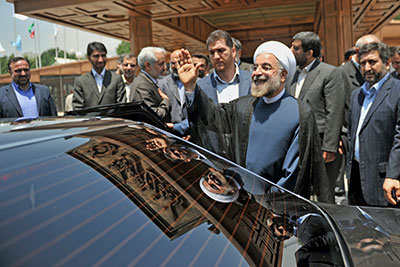After eight hellish years for Iran’s journalists under outgoing President Mahmoud Ahmadinejad, the election of Hassan Rouhani was welcomed with hope for a better future. As soon as he takes office in August, he should act on his view and take steps to protect journalists in Iran.
Admittedly, it is not clear how much influence Rouhani will have as president. In Iran, the judiciary and government work separately (the third power is Parliament), and all these forces work under Supreme Leader Ayatollah Ali Khamenei, who also has an eye on some government divisions such as the intelligence services. While arrests are made by the judiciary, the president has the power to negotiate or raise awareness in some cases.
In his first press conference after the election, Rouhani was asked if he would lift restrictions on certain political figures, a likely reference to opposition leaders Mir Hossein Mousavi and Mehdi Karroubi, who are under house arrest. In response, he admitted it was not his decision alone, the Guardian reported. The same likely applies to imprisoned journalists.
The president-elect benefited from the support of reformist journalists inside and out of Iran. Many have fled into exile, fearing arrest, and many of those who remain are imprisoned or unemployed as a result of the shutdown of media outlets. Even conservative and state-affiliated outlets have not escaped the press crackdown in Iran, CPJ research shows.
Ideally, Rouhani could try to open up Iran’s tightly controlled system and facilitate freeing imprisoned journalists. Iran is the second worst jailer of journalists in the world, after Turkey, with 40 behind bars. But if the ideal is impossible, there are small steps he could take like negotiating for visitation rights, furlough, and adequate medical care denied many imprisoned journalists.
For example, he could negotiate for regular furloughs and ensure visitation rights for Bahman Ahmadi Amouee, who was arrested during the Green Movement uprising and sentenced to five years in jail. Released for a short furlough in March, Amouee is back in prison, per CPJ research. His journalist wife, Zhila Bani Yaghoub, was released last month after serving a one-year prison term, according to news reports.
The government could also reinstate publications which have been banned, giving ordinary Iranians access to a wider range of news sources and journalists better employment opportunities. Publications need permission to run from the Ministry of Culture and Islamic Guidance and under Rouhani’s watch, there is potential for conditions to improve. A safer situation in Iran and more employment opportunities could also help some Iranian journalists who fled the country after the 2009 crackdown return. Currently, some of them work–mostly on contract– for international outlets such as BBC Persian, Voice of America, and Radio Free Europe, but many are unemployed or work on small projects that are dependent on grants.
The family members of some journalists living abroad have been harassed: summoned, questioned, and threatened that they will lose their job or retirement benefits if the journalist continues his or her work, CPJ research shows. Rouhani should insist this harassment stops.
Online censorship and surveillance also needs to be addressed. Iran’s current Internet regime creates major barriers not only for journalists to do their work, but for ordinary Iranians to access independent news sources. Some of the tightest constraints against the Internet have eased since the election, but even the pre-election “normal” is very restricted. Rouhani seems to agree. In a speech on July 2, he said the widespread filtering of the Internet has only increased distrust between the people and the government, according to his Twitter account. He even called social media a “welcome phenomenon.”
Iran could also take steps to facilitate the work of international journalists. Leading up to the presidential elections, CPJ described how the Iranian government restricted independent international coverage. If they do gain access to the country, journalists run the risk of interrogation or detention if they stray far from the regime’s designated path. Iran dar Jahan (Iran in the world), an exile-run publication based in New York, reported that American journalists censor themselves in order not to lose their press visa or jeopardize their chance of getting a visa in the future. The government should stop withholding visas and allow international journalists to report freely.
Finally, Rouhani should ensure that the Iranian Journalist Association be allowed to reopen. When asked about the association during his first press conference, he responded, “All the guilds should be permitted to work freely.”
Many Iranian voters say their main motivation for choosing Rouhani is the promises he made during his campaign. Rouhani is known as a moderate politician and this can be his strong point in negotiating between different factions of power in Iran’s complicated political landscape.
